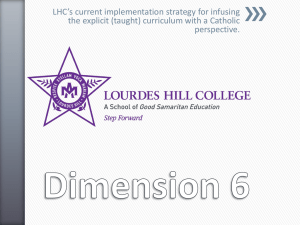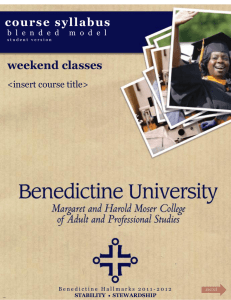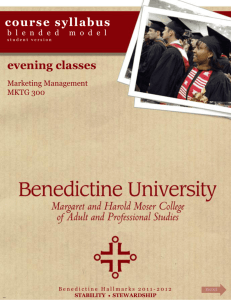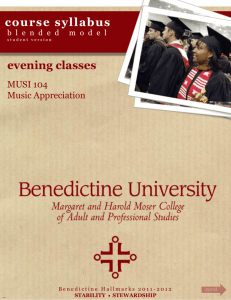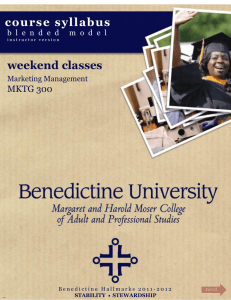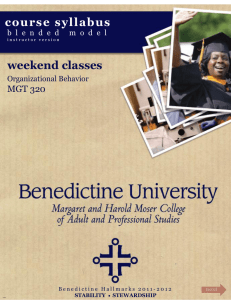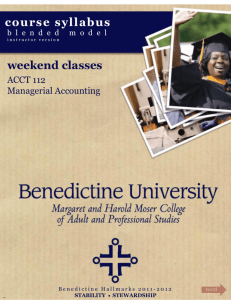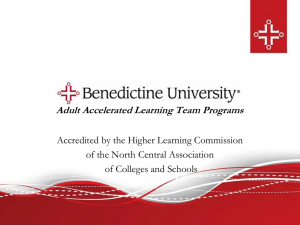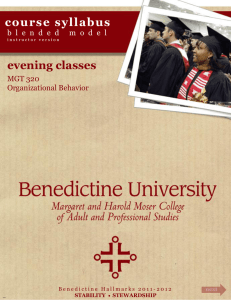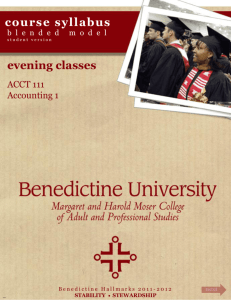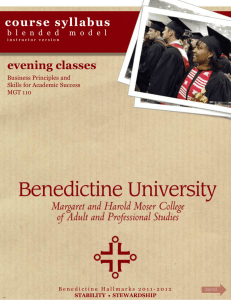MGMT_581_Blended_FWE - MoserCollegeHypermediaSyllabi
advertisement
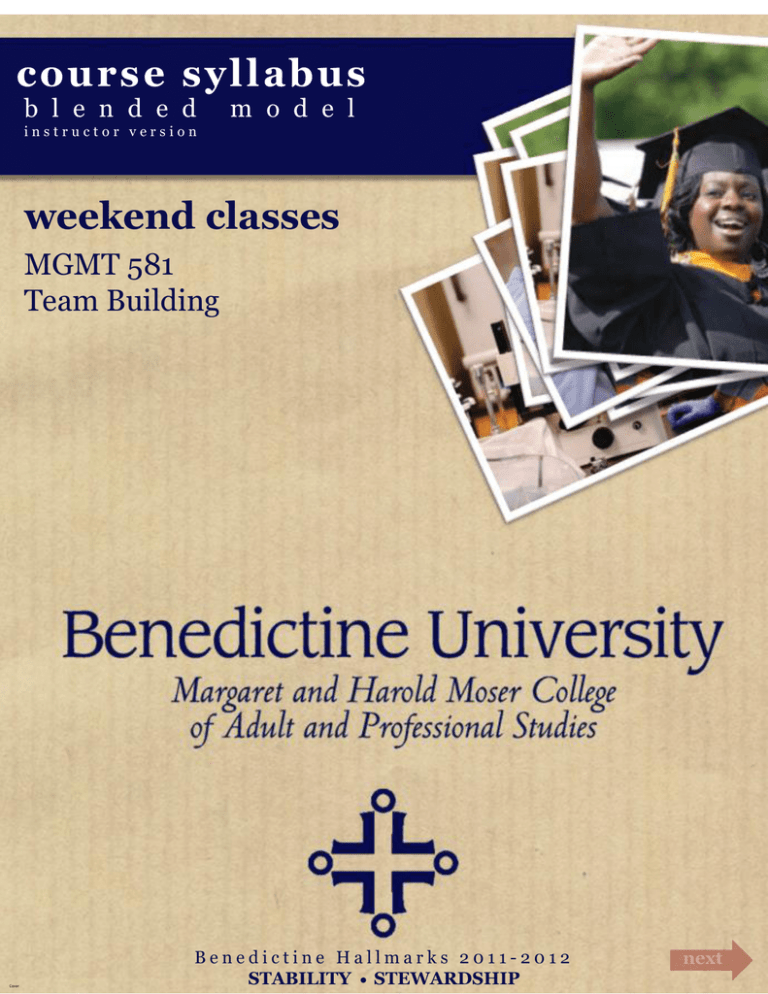
course syllabus b l e n d e d m o d e l instructor version weekend classes MGMT 581 Team Building home Cover about expectations resources course overview learning outcomes Benedictine Hallmarks 2011-2012 STABILITY STEWARDSHIP IDEA schedule & sessions next course syllabus Addresses the educational needs of adult students by developing and providing engaging, relevant and accelerated programs. blended model MGMT 581 Enhances scholarship, leadership skills, social responsibility, and promotes life-long learning. Provides high-quality, easily accessible educational opportunities for adult learners. Enables adults to earn specific undergraduate and graduate degrees while maintaining their personal and professional commitments. Team Building instructor version Develops new degree and non-degree programs that address the expressed needs of the professional community. content links index about this document about Moser College about blended learning hallmarks of a Benedictine education student expectations attendance policy financial aid submission of work library resources services for students with disabilities Academic Honesty Policy APA formatting and style netiquette course overview required textbooks grading scale IDEA objectives IDEA description learning outcomes course schedule Moser College Mission Statement: Moser College embodies the values of respect, excellence, collaboration, and professionalism. We are committed to delivering innovative and dynamic programs designed for adult students who are dedicated to enhancing their professional, local, and global communities. Moser College Vision Statement: To be one of the premier university colleges in the nation. Love of Christ and Neighbor Prayer Stability Conversatio Obedience Discipline Humility Stewardship Hospitality Community Benedictine University home about expectations Margaret and Harold Moser Center 1832 Centre Point Circle Naperville, IL 60563 resources course overview learning outcomes Phone: (630)schedule 829-6289& IDEA sessions Fax: (630) 829-1375 http://www1.ben.edu/programs/a dult_cohorts/mission_vision.asp 2 Content Links Team Building | MGMT 581 About Your Program at Benedictine University – Moser College About This Document This is a hypermedia document – it has been built to mimic navigation on the web. This document can also be viewed as a presentation or it can be printed like a traditional document. We use this sort of document because it allows for navigation links (hyperlinks) to text, graphics, audio/video, and the web. This type of document also allows you to navigate in a nontraditional, nonlinear way – by following the page links you are not bound to read or flip through the document in any sort of order. This is yet another example of Moser College’s commitment to advancements in technology and blended learning. About Moser College The Moser College of Adult & Professional Studies delivers its curricular programs in a specifically designed structure deliberately oriented for working, adult learners. The Moser College is committed to providing a learning environment which extends beyond the classroom and is designed specifically to meet the needs of its students and their employers by bringing a quality educational experience without requiring the student to relocate or travel extensively beyond their home area. Benedictine University's Moser College of Adult & Professional Studies is fully accredited by the Higher Learning Commission of the North Central Association of Colleges and Schools*. * http://www.ben.edu/academic_programs/moser/about/index.cfm About Blended Learning Blended learning is the integration of different learning environments: mainly the online format with the face-to-face format, but may also include mobile learning. Blended learning, also referred to as hybrid learning, relies on both the advantages of digital/technology innovation and the methods of face-to-face instruction. At Moser College, we use blended learning by combining asynchronous online classroom sessions with a face-to-face classroom environment. We alternate between the online session and the face-to-face session in 5-week courses, with the A session being face-to-face and the B session being online. hallmarks of a Benedictine Education: home about expectations resources course overview learning outcomes IDEA schedule & sessions Love of Christ and Neighbor Prayer Stability Conversatio Obedience Discipline Humility Stewardship Hospitality Community 3 About Team Building | MGMT 581 The Ten Hallmarks of a Benedictine Education A Benedictine Education Based on the Rules of Saint Benedict, a Benedictine Education is based on the Benedictine Wisdom Tradition that sets as its goals the transformation of the Human mind AND Heart and has at its foundation “The Ten Hallmarks of a Benedictine Education”. The Ten Hallmarks Each academic year Moser College will be celebrating two of the Hallmarks. This academic year 2011-2012, the Hallmarks Stability and Stewardship have been chosen. The ten hallmarks are: 1. Love of Christ and Neighbor 2. Prayer: a Life marked by liturgy, lection and Mindfulness 3. Stability: commitment to the daily life of this place, its heritage and tradition 4. Conversatio: the way of formation and transformation 5. Obedience: a commitment to listening and consequent action 6. Discipline: a way toward learning and freedom 7. Humility: knowledge of self in relation to God, others and creation 8. Stewardship: responsible use of creation, culture and the arts 9. Hospitality: openness to others 10. Community: call to serve the common good home about expectations resources Portrait (1926) by Herman Nieg (1849–1928); Heiligenkreuz Abbey, Austria course overview learning outcomes IDEA schedule & sessions Love of Christ and Neighbor Prayer Stability Conversatio Obedience Discipline Humility Stewardship Hospitality Community 4 Hallmarks Team Building | MGMT 581 Student Expectations Expectations of Students In order to get the maximum use of the time available, it is expected that you will: • Read the material to be covered in the class and complete required assignments prior to attending the class/session; • Arrive/login to class/session prepared to participate actively; • Be prepared to actively participate in the collaborative activities of each class/session; and • Always feel free to seek additional help from the instructor when the need arises. Attendance Policy Students may not miss more than 25% of the live classroom sessions. Doing so will result in an F for the course. financial aid information Submission of Work All assignments are to be submitted into Desire 2 Learn (D2L) unless otherwise noted by instructor. Assignments must be submitted by due date. Any assigned work submitted late for any unexcused reason will receive a lowered grade. Please refer to your instructor’s late work policy located in D2L. In the event that you miss an examination for due cause, arrangements must be made with the instructor for a make-up examination. Important criteria concerning the submission of work: • Make-up examinations may differ from the original class examination. • Per University policy, assignments cannot be accepted by an instructor after the last day of the course. • Only discussions threads posted by 11:59 pm CST on the due date will count for grading purposes. information concerning netiquette: home about expectations resources course overview learning outcomes IDEA schedule & sessions Love of Christ and Neighbor Prayer Stability Conversatio Obedience Discipline Humility Stewardship Hospitality Community 5 Expectations Team Building | MGMT 581 Financial Aid Information Applying for Financial Aid A college education is one of the largest financial investments a family will make. We believe that an education from Benedictine University will provide valuable returns throughout a student's lifetime. The Office of Financial Aid is dedicated to helping students and their families make a Benedictine University education affordable. We view the process of financing an education as a partnership. Although the student and his/her family have primary responsibility for meeting college costs, Benedictine University, as well as the federal and state governments have a variety of financial aid programs available to students who need financial assistance. Types of Financial Aid Benedictine University's Office of Financial Aid administers a variety of federal, state and institutional programs of student financial assistance. All financial aid recipients must maintain satisfactory academic progress in accordance with the published, "Satisfactory Academic Progress Policy for Financial Aid Recipients.“ • After completing the financial aid application process, the student will receive a financial aid award notification letter. The award letter will include the program(s) that the student is eligible to receive and the award amount(s). • Grants/Scholarships - Grants and scholarships are considered to be gift assistance. This means the awards do not have to be repaid. • Loans - Loans are considered to be a form of self-help assistance. Loan programs provide funds for educational purposes and are paid back with interest. • Employment - Part-time jobs on campus are available to students through the University and Federal Work-Study program. Students working on campus receive a bi-weekly paycheck. • Applying for Financial Aid – All students applying for financial aid are asked to complete the Free Application for Federal Student Aid (FAFSA). FAFSA – Free Application for Federal Student Aid The FAFSA is required for all federal, state (Illinois residents) and Benedictine University need-based assistance. It should be completed as soon as possible after January 1st. Applying online with FAFSA on the Web at www.fafsa.gov is faster and easier than using a paper FAFSA. Have your completed U.S. Federal Income Tax returns readily available when completing the FAFSA. Include Benedictine University's school code: 001767 so the results of your FAFSA application will automatically be sent to our financial aid office. Sign you FAFSA with a Federal Student Aid PIN. Apply for a PIN at www.pin.ed.gov. If you are providing parent information, one parent must also sign you FAFSA. home about expectations resources course overview learning outcomes IDEA schedule & sessions Love of Christ and Neighbor Prayer Stability Conversatio Obedience Discipline Humility Stewardship Hospitality Community 6 Financial Aid Team Building | MGMT 581 About Netiquette What is Netiquette? "Netiquette" stands for "Internet Etiquette", and refers to the set of practices which help to make the online experiences pleasant for all involved. As you might expect, netiquette, like other forms of etiquette, is about courtesy, manners, codes of behavior, protocols and respect. Netiquette primarily focuses on how we interact with one another online, by being aware of: our use of language, others’ cultural background, conventional norms, and other behaviors. Below you will find guidelines concerning the basics of online interaction. If it isn’t something you would say or do in the face-to-face classroom, it is probably inappropriate in the online class as well. Netiquette Basics 1. Follow the Golden Rule (“One should treat others as one would like others to treat oneself”) 2. Be ethical, fair, tolerant and mindful of others – avoid stereotyping, judgment and prejudice 3. Know the boundaries of particular cyberspaces – what is acceptable in a text or chatroom with friends may not be appropriate in a classroom or in an online conversation with an instructor 4. Respect the time of others by: 1) using descriptive subject lines, 2) resizing images for the web, 3) providing links instead of copying and pasting content, 5) using white space by inserting blank lines between paragraphs and headers and 6) limiting your use of attachments 5. Copy the minimum number of people – it is tempting to send “email” or “message blasts” because it is easier for the poster, but it is not easier for the reader Inappropriate Online Usage 1. Avoid “flaming” – flaming is sending offensive, insulting or criticizing messages. This happens more often online then in face-to-face interaction, because there is an illusion of anonymity. 2. Flaming is neither productive nor appropriate for the learning environment 3. Always avoid flaming when it comes to content and opinions, but also avoid it when it comes to grammar, punctuation and spelling corrections 4. Avoid using CAPS if possible and never type messages in ALL CAPS – this is considered yelling and is often seen as a form of aggression 5. Use emoticons ( :) , :( , :-) ) sparingly and avoid the use of JK, BRB, LOL and other text language Confidentiality and Privacy 1. 2. 3. 4. Email, messaging and posting are forms of written record and are just as permanent as a letter or document Do not publicize your own or others’ personal information (such as email, phone numbers, last names etc.) Respect copyright and cite any and all sources Do not expect that your communications are private, instead assume all communications are public For more information please review Netiquette by Virginia Shea home about expectations resources course overview learning outcomes IDEA schedule & sessions Love of Christ and Neighbor Prayer Stability Conversatio Obedience Discipline Humility Stewardship Hospitality Community 7 Netiquette Team Building | MGMT 581 Resources for Success Benedictine’s Library Resources Benedictine University Libraries strive to provide the resources for all of your academic and research needs. Providing access to over 120 databases, 200,000 books and eBooks, and helpful librarians 7 days a week, we are here to assist you in person and online. The primary mission of the Benedictine University Library is to provide library resources and services that support the Benedictine University community and meet its academic and research needs. To support our mission, the Library has made provisions for all students to gain access to important academic resources through the Benedictine Library Website. As you begin your academic journey please take note of these key concepts that will affect that access: • Entry into academic databases and most Library resources must be made through the Benedictine Library Website at www.ben.edu/library • Within one week of your official enrollment your patron information will be automatically entered into the library system, where once entered, you will be able to check out books and access databases • When off-campus you will be prompted by authentication software (a proxy server) to provide your Library ID number and last name to access article databases and request books. This software proxy server confirms that you are a current Benedictine University student and thus allowed access • Your Library ID number is a combination of the Benedictine Library prefix 2281100 and your seven-digit student ID number (also called your “b” number). Thus 2281100XXXXXXX is the Library ID number with X’s being the seven digit student number. This number is prominently located just below the barcode on your Benedictine ID card • For further information on any aspect of Library resources and access please call or write the Benedictine Library Reference Desk at 630-829-6057 or libref@ben.edu. Please take note of Library hours and staff directory located on the Library Website under About the Library and feel free to contact us about any concern or need you might have additional resources for student success: home about expectations resources course overview learning outcomes IDEA schedule & sessions Love of Christ and Neighbor Prayer Stability Conversatio Obedience Discipline Humility Stewardship Hospitality Community 8 Library Team Building | MGMT 581 Resources for Success University Academic Honesty Policy The search for truth and the dissemination of knowledge are the central missions of a university. Benedictine University pursues these missions in an environment guided by our Roman Catholic tradition and our Benedictine Heritage. Integrity and honesty are therefore expected of all University students. Actions such as cheating, plagiarism, collusion, fabrication, forgery, falsification, destruction, multiple submission, solicitation, and misrepresentation are violations of these expectations and constitute unacceptable behavior in the University community. To access the complete Academic Honesty Policy, which includes student responsibility, responsibility and authority of faculty, violations, reporting and communicating, responsibilities of the provost, appeals, composition of the academic appeals board, procedures of the academic appeals board, and records, please select the following link: www.ben.edu/ahp APA Formatting and Style All course assignments must use APA citation and formatting. This is a mandatory requirement for all assignments, including discussions, if a publication or other work is being referenced. For more information on APA, please see the APA Style section at the website of the American Psychological Association, linked here: www.apa.org/ APA resources for students: www.apa.org/about/students.aspx Services for Students with Disabilities Section 504 of the Rehabilitation Act of 1973 and the Americans with Disabilities Act (ADA) of 1990 prohibit discrimination against individuals with disabilities by standing provision of reasonable accommodations to make programs and activities accessible to qualified individuals with disabilities. If you have a documented learning, psychological, or physical disability, you may be eligible for reasonable academic accommodations or services. To request accommodations or services, please contact the Student Success Center, Krasa Center - 012A, 630-829-6340. All students are expected to fulfill essential course requirements. The University will not waive any essential skill or requirement of a course or degree program. home about expectations resources course overview learning outcomes IDEA schedule & sessions Love of Christ and Neighbor Prayer Stability Conversatio Obedience Discipline Humility Stewardship Hospitality Community 9 Other Resources Team Building | MGMT 581 Individual Development and Educational Assessment IDEA Objectives • Acquiring skills in working with others as a member of a team. • Developing creative capacities (writing, inventing, designing, performing in art, music, drama, etc.) • Gaining a broader understanding and appreciation of intellectual/ cultural activity (music, science, literature, etc.) • Developing skill in expressing oneself orally or in writing. • Learning how to find and use resources for answering questions or solving problems. • Developing a clearer understanding of, and commitment to, personal values. • Learning to analyze and critically evaluate ideas, arguments, and points of view. • Acquiring an interest in learning more by asking questions and seeking answers. IDEA Description The IDEA student survey focuses on the instructor’s learning objectives for the course and on the progress each student made toward achieving those objectives. By answering thoughtfully and honestly, your ratings and comments will be much more helpful – to the instructor, the department chair, and the dean of the college. As students, you should also know that student ratings and comments have been used to help evaluate courses and to improve the educational experience at Benedictine University. The appropriate standard of conduct with respect to student surveys is thoughtful comments and constructive criticism – respectfully communicated. A Focus on Learning “The IDEA Student Ratings system looks at instruction in terms of its endgame. Rather than emphasizing teaching style or personality, the IDEA system focuses on student learning and the methods used to facilitate it.” – from the IDEA website: www.theideacenter.org/node/5 home about expectations resources course overview learning outcomes IDEA schedule & sessions Love of Christ and Neighbor Prayer Stability Conversatio Obedience Discipline Humility Stewardship Hospitality Community 10 IDEA Team Building | MGMT 581 Faculty Weekend Course Overview Course Description and Page Navigation The course develops a working knowledge of team building, its theoretical basis and its strengths and weaknesses as an organization development intervention. Working in teams has become necessary in most organizations because of the complexity of tasks to be performed and the interdependence necessary to get the job done. The intensity of teamwork applied may vary from one situation to another and from one context to another. Teams vary from being very tightly coupled with high intensity of member interaction - at one extreme, to very loosely-coupled teaming with lower levels of member interaction. The intensity varies with the degree of interdependence needed for the team to function well. In all situations however, members must possess the skills and adaptive capabilities that facilitate working in a coordinated and cooperative way with others to achieve the best possible outcomes. 2 semester hours. Course Materials Required Textbook and Materials Thompson, L., (2011). Making the team: a guide for managers. (4th ed.). ISBN: 9780136090038 Suggested Course Materials Weekly news article from scholarly or other accredited source. Technological Computer Requirements Students in the Blended program will need: High-speed Internet access; a sound card and speakers; Windows XP (minimum)/Windows 7 (recommended) or Mac OS X 10.5 or higher; and Firefox 3.6 or higher. It is also highly recommended that students have access to a microphone or webcam for optional audio/videoconferencing. Discussion Forum Guidelines The Course Grading Scale A = 4.00 90 - 100% EXCELLENT B = 3.00 80 – 89% GOOD C = 2.00 70 – 79% SATISFACTORY D = 1.00 60 – 69% PASS F = 0.00 BELOW 60% FAIL I = INC INCOMPLETE home about expectations resources To receive a minimum passing grade, students must make a post to each discussion question for that week by day 4 of each week and respond to at least two other postings by the end of the week. Individual Posts are worth up to 5 points and the total Response Posts are worth up to 5 points total. Each discussion will total up to 10 points. course overview learning outcomes IDEA schedule & sessions Love of Christ and Neighbor Prayer Stability Conversatio Obedience Discipline Humility Stewardship Hospitality Community 11 Course Overview Team Building | MGMT 581 Faculty Weekend Course Outcomes Based in Bloom’s Taxonomy Learning Outcomes • Assignments apply the core concepts and skills for teamwork Points Developing Course Materials: Teamwork in the News 10 pts each 5 pts ea/wk 5 pts ea/wk • develop insight, command of, and the skills needed to engage in successful team building Discussion Question(s) Response Post(s) • analyze the aspects of: performance, reward systems, communication, collective intelligence, leverage, and cooperation Chapter Summaries /Outlines • acquire knowledge and exposure needed to be able to experience positive outcomes • demonstrate how to apply learned skills to real world situations • explain how creative strategies affect team building and teamwork activities • explain how brainstorming activities and strategies for high performance encourage success in the marketplace • compare and develop methods for incorporating teamwork in day-to-day activities as well as in “big picture” missions and goals • explain and illustrate: networking, social capital, leadership tools in the context of teamwork, the dynamics of relationships in teams, and self-esteem and self-identity in context of the team 20 pts ea/wk Strategic Plans • Team Building Exercises 100 pts Team Organization Plan 100 pts Written Assessment Prompts • Short Answer Quiz 150 pts • • Case Analysis 150 pts Discussions in Class • class participation • in class activities (F2F & Web 2.0) Group Designed Team Building Seminar/Webinar Presenter's Outline (outline of the individual’s component of the group presentation) Total Points for course 75 pts 200 pts 25 pts 1000 pts about Bloom’s Taxonomy home about expectations resources course overview learning outcomes IDEA schedule & sessions Love of Christ and Neighbor Prayer Stability Conversatio Obedience Discipline Humility Stewardship Hospitality Community 12 Learning Outcomes Team Building | MGMT 581 Faculty Weekend Course Schedule Session Loc. Class Title Assignments 01 A F2F The Basics of Teamwork • • • • • 01 B online Internal Dynamics • • • • • • • 02 A F2F External Dynamics • • • • 02 B online Managing, Facilitating, Guiding and Efficiency • • • • home about expectations resources course overview Thompson Part 1 – Chap 1 – 3 Review selected source (ie. Team Building in the News) Summary of Part 1 Creating icebreaker activities Developing team-building activities Thompson Part 2 – Chap 4 – 9 Short Answer Quiz Review selected source (ie. Team Building in the News) Summary of Part 2 Case Analysis Assembling a team List of traits needed for teamwork Thompson Part 3 – Chap 10 – 13 Creating icebreaker activities (readdress this topic from Sess. 01A) Group: Team Building Seminar Group: Team Building Webinar Thompson Appendices 1 – 4 Review selected source (ie. Team Building in the News) Summary of Part 3 Strategic Plan: Team Organization Plan (written assignment) learning outcomes IDEA schedule & sessions Love of Christ and Neighbor Prayer Stability Conversatio Obedience Discipline Humility Stewardship Hospitality Community 13 Course Schedule Team Building | MGMT 581 Faculty Weekend Session 1A Learning Objectives 1. Develop goals that can be reached by team-members 2. Compare and contrast individual strengths with strengths of teams and teamwork 3. Evaluate and utilize the equity method 4. Verify the processes and methods of teamwork 5. Establish targets, benchmarks and performance criteria 6. Develop communication skills within a team setting 7. Create plans for future work and future goals 8. Analyze and implement different brainstorming methods 9. Use brainstorming tactics in a team-setting 10. Develop idea-generating techniques instead of brainstorming 11. Outline the processes for generating new concepts and creative ideas 12. Evaluate the keys to promoting creative teamwork 13. Engaging creativity exercises and team building Activities, Assignments and Agenda Reading: Thompson Part 1 – Chap 1 – 3 Study Group and In Class Assignments Individual Assignments Strategic Plan: Team Building Exercises: We can explore the dynamics of teamwork through the ways in which individual members approach tasks and challenges. Make a list of three objectives – these can be goals for your current organization, or the purpose of a future/fictional group. Develop a teambuilding activity for each of the goals. Explain how these team-building activities accomplish the goals. Reflect on the successes and challenges of these methods. (written assign., 3-4 pgs – APA format) Teamwork in the News: Each week select a source to share with the class that connects somehow to this week’s readings. Bring a sample of this source to class. Be prepared to summarize and share the information with the class, leading an informal discussion. Chapter Summary: List key ideas or key phrases, outlining the chapter readings. Include questions, comments and personal connections to the material. Be prepared to share these points in class discussion. home about expectations resources In Class Activities: (suggested activity) As groups, prepare two or three different “icebreaker” activities and demonstrate with the class how these activities work. Then explain how these are useful in team building situations. course overview learning outcomes IDEA schedule & sessions Love of Christ and Neighbor Prayer Stability Conversatio Obedience Discipline Humility Stewardship Hospitality Community 14 Session 1A Team Building | MGMT 581 Faculty Weekend Session 1B Learning Objectives 1. 2. 3. 4. 5. 6. 7. Develop goals that can be reached by team-members Compare and contrast individual strengths with strengths of teams and teamwork Evaluate and utilize the equity method Verify the processes and methods of teamwork Establish targets, benchmarks and performance criteria Develop communication skills within a team setting Create plans for future work and future goals Activities, Assignments and Agenda Reading: Thompson Part 2 – Chap 4 – 9 Individual Assignments Discussion Question: Why should organizations utilize teamwork? How are teams organized in your organization (school, work, church, charity etc.)? How does team context affect teams in your organization? Short Answer Quiz: Use D2L to create a short answer quiz covering the material thus far. This quiz should include “short answer” or “essay” questions. This quiz can use “real world” scenarios. It is recommended that the instructor not rely on T/F and Multiple Choice as those tend not to target Evaluation, Examination, Discussion or Development (as goals). Study Group and Online Assignments Case Analysis (Group): At the opening of each chapter, Thompson outlines a brief case which illustrates ideas and concepts furthered in the chapter. Students should choose one of these for the Case Study. Students should address these 5 subtopics: 1) clearly identify the “actors” (the person(s) involved, 2) summarize the scenario, 3) specifically state the conflict, dilemma or situation, 4) state an opinion or solution concerning the case, and 5) support ideas with course material and course discussions. Type this in an essay format and use the 5 subtopics as headings. Online Activities: (suggested activity) Students complete an internet “scavenger hunt.” The instructor prepares questions in D2L or on some Web 2.0 format (wiki, blog, chatroom). Groups work together to complete the scavenger hunt. Have groups share with the class how a “virtual hunt” is different from a F2F? Online Activities: (suggested activity) Create a “mindmap” or “graphic web” graphic organizer, connecting ideas from the course and Chapters 2 & 3. Use a web resource such as https://bubbl.us/ (Bubbl Us – Brainstorming Made Simple). home about expectations resources course overview learning outcomes IDEA schedule & sessions Love of Christ and Neighbor Prayer Stability Conversatio Obedience Discipline Humility Stewardship Hospitality Community 15 Session 1B Team Building | MGMT 581 Faculty Weekend Session 2A Learning Objectives 1. 2. 3. 4. 5. 6. 7. 8. Analyze the aspects of direct vs. indirect communication Create organizational hierarchies for an individual organization Develop goals for individuals within a collective Compare and contrast individualism vs collectivism Explore egalitarianism in reference to its influence on team atmosphere Assess cultural intelligence and cultural values Evaluate work ways in a team building culture Become more culturally sensitive through cross-cultural teamwork Activities, Assignments and Agenda Study Group and In Class Assignments Reading: Thompson Part 3 – Chap 10 – 13 Group Designed Team Building Seminar: As a team, students should develop a Team Building Seminar. This seminar should include: 1) a mission statement, 2) a list of objectives, 3) an agenda, 4) strategies for successful teambuilding, 5) essentials for leading, coaching and mentoring, and 6) activities and lessons to help build strong teamwork in an organization. Individual Assignments Teamwork in the News: Each week select a source to share with the class that connects somehow to this week’s readings. Bring a sample of this source to class. Be prepared to summarize and share the information with the class, leading an informal discussion. Chapter Summary: List key ideas or key phrases, outlining the chapter readings. Include questions, comments and personal connections to the material. Be prepared to share these points in class discussion. Presenter’s Outline and Summary: Each group member is responsible for a 3 – 5 minute speaking segment during the presentation. The student should summarize what s/he is said or will be said in a brief synopsis. Include a bibliography of sources. home about expectations resources Group Designed Team Building Webinar: Students may choose to create a “webinar” as opposed to a traditional seminar. This webinar should be published online and should follow the same criteria outlined above. In Class Activities: (suggested activity) Students engage in various types of team-building activities: collaborative, communication, decision making, brainstorming, and trust activities. Examples include: back-2-back drawing, building the tower, cat’s cradle, egg drop, human spring, the maze, toe-to-toe, and pipeline. course overview learning outcomes IDEA schedule & sessions Love of Christ and Neighbor Prayer Stability Conversatio Obedience Discipline Humility Stewardship Hospitality Community 16 Session 2A Team Building | MGMT 581 Faculty Weekend Session 2B Learning Objectives 1. 2. 3. 4. 5. 6. 7. 8. Analyze the aspects of direct vs. indirect communication Create organizational hierarchies for an individual organization Develop goals for individuals within a collective Compare and contrast individualism vs collectivism Explore egalitarianism in reference to its influence on team atmosphere Assess cultural intelligence and cultural values Evaluate work ways in a team building culture Become more culturally sensitive through cross-cultural teamwork Activities, Assignments and Agenda Study Group and Online Assignments Reading: Thompson Appendices 1 – 4 Strategic Plan: Team Organization Plan: As groups, prepare an Organizational Plan. This plan should focus on strategies and procedures which will restructure organization to allow for more teamwork. This plan should include: Individual Assignments Discussion Question: Team Spirit and Team Mind could have a significant influence on enhancing creativity in teams -- Do you agree? Why or why not? Discuss how nurturing leadership can be instrumental in creating and maintaining high performance teams. home about expectations resources Describe the concept(s) in focus • Provide interpretations of the concept (what it means to you) • Apply additional journal readings to enrich interpretation • Apply concepts to situations if required by the assignment, and • Discuss the merits of the application • Discuss implications course overview learning outcomes IDEA schedule & sessions Love of Christ and Neighbor Prayer Stability Conversatio Obedience Discipline Humility Stewardship Hospitality Community 17 Session 2B
